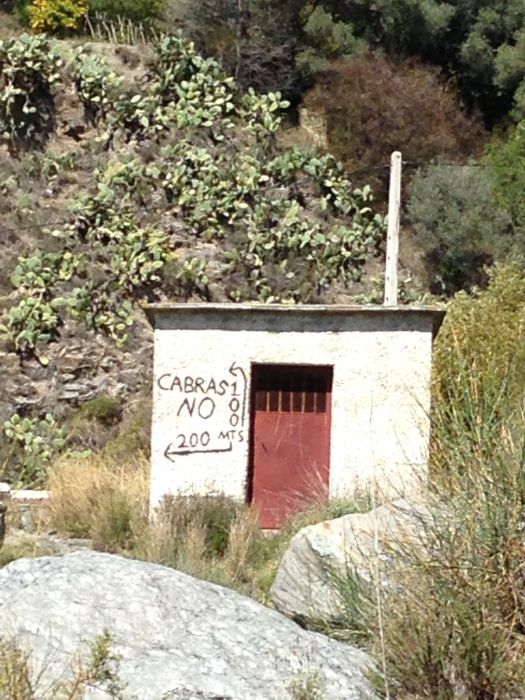When our elderly Spanish neighbour who, like many native Órgivians, lives in town but keeps land and animals in the campo (and thinks foreigners are loco for wanting to live in old stone animal barns) presented himself at the house of friends with a message for us – that a goatherd with a couple of hundred beasts had offered 12.5 million pesetas for his property, but we could have it if we paid more, we initially fell about laughing, speculating about how many pesetas could be scraped out of the ancient nooks and crannies of our old cortijo.
Spain joined the eurozone in 1999 – one of the first-wave of countries to do so – fourteen years after it joined the European Union. The euro became the official currency on 1 January 2002 and the transitional dual circulation period, when both currencies had legal tender status but the peseta only as “book money” that had to be converted to euros, ended three months later.
It’s not surprising that for our neighbour’s generation, or even the goatherd’s, the euro has never become the acceptable currency. Indeed the Spanish central bank revealed a couple of years ago that some €1.7bn worth of pesetas was still held by Spaniards. Perhaps those brought up in rural communities such as ours are, even now, using them to make black economy transactions. Though if they are they can’t exchange them for euros except with the central bank.
And of course many Spanish blame “el crisis” – Spain’s economic “great recession” – on joining the euro because of the housing bubble that followed and which burst so spectacularly. The collapse of the Spanish banks revealed irresponsible and predatory subprime mortgage lending – still a major cause of misery and suicide as people lose their homes but, unlike in the UK, continue to have to pay off the debt.
Those who still think in pesetas are also pretty canny with their mental currency converters. They know what the conversion rate was fixed at in 1999. The rest of us are grateful that online versions still exist that don’t simply declare the peseta to be obsolete. For when we considered the implications of living next door to 200 smelly cabras, along with their dogs, our neighbour’s offer suddenly became a lot less funny.

Our sentiment exactly
Our water-man confirmed the story. The goatherd intended to build a nave (a warehouse, in the industrial sense of the Spanish word) to house his livestock. The animals would also have the run of the land. “Muy mal” he said, holding his nose and suggesting that we might want to pay the money.
We suddenly felt as though we had woken in a gigantic pool of blood, 200 goat heads placed in our bed as we slept. Our neighbour may not look much like a mafia boss, but it increasingly looked like an offer we could not refuse.
Rapid consultation with other near residents, some of whom have goats overnighting close to them, though not as close as this would be, further convinced us to scupper the goatherd’s plans. Cute as they are, the smell of goats is a taste few people acquire, and what with the horse flies, noise and other delights that would accompany a large herd in small confinement, we might as well abandon our home.
Within hours we learn that our neighbour has rejected the goatherd’s initial offer, it’s been upped by another million pesetas and is about to be accepted. Another consultation with the currency converter reveals he’s pushing close to the official asking price (in euros), albeit a substantially reduced one since the property went on the market two years ago.
We wondered, cynically, having converted pesetas into pounds and it sounding much better, if we might try it in another long-redundant, more over-valued currency to get an even better result. You say peseta, we say Italian lira, perhaps.
And so we find ourselves about to be the owners of nearly 1500 m2 of land with two huge avocado trees, olives, oranges, nisperos (medlar fruit), three chickens, some scabby cats, a trailer (oh what luck, we were planning to buy one of them), a three-roomed casita with no bathroom or kitchen, and an out-building. But even the wise heads of Orgiva’s legal advice and translation service, who helped us in dealing with our neighbour’s determined daughters and the legal paperwork, agreed we had no option.
There are of course bright sides to this predicament. We have learned from this whirlwind process that in Spain, vendors who receive an offer for a rural property which they are inclined to accept are obliged to offer it to their immediate neighbour, especially if the land was once part of the same catastral (piece of land), as ours was. So at the very least, we know our rights have been respected.
And then there’s the strategic benefit of owning land adjacent to ours, given the options it opens up (and closes down), increased water rights at a more sensible time of day than we currently enjoy (see Zeds (or lack of them) and the art of pool maintenance), and finally being shot of a not so easy vecino.
Our daughter, who plays the video strategy game Civilisation, commented that it was a bit like a move where a city state is invaded for tactical reasons to stop someone else having it, and by doing so yet another piece of land is blocked off which could have value to opponents.
And judging from a call we received from the owners of a holiday home the other side of the would-be goat ranch, we might yet be considered local heroes.
